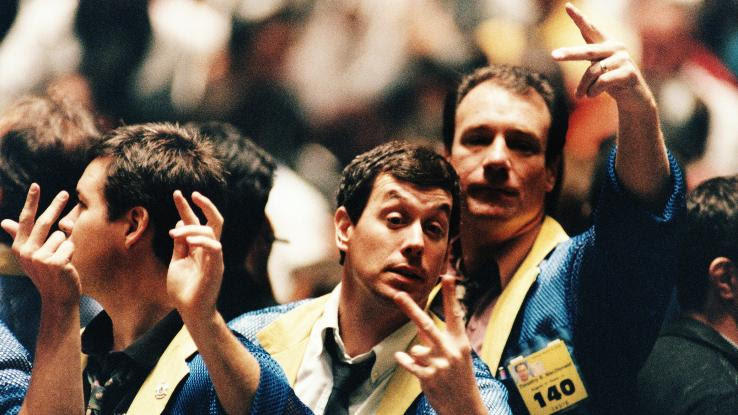How to Upload New Pricing to Amazon Market Place

It doesn't take long before beginning investors are hit with market lingo like "market toll per share" and "volume price per share." But what do these terms actually hateful, how are they different, and why should you lot care? Join us as we break downwards the meanings of both, tell you how to decide them, and how they can be useful information for y'all as an investor to go along in mind.
What Is Market Price Per Share?

Simply put, a stock'southward market price per share is the price that appears whenever you click on its ticker. If the stock is experiencing a day of heavy volume, the market price per share may literally change past the second as the price fluctuates up and down.
That's because the market cost per share is all about supply and demand. In essence, it's the cost that the stock is trading for at any given moment. The more people who are interested in buying the stock, the more its going rate will climb. When at that place are more investors interested in selling their shares than there are those interested in ownership them, the price will get downwardly.
Several things can cause a sure company's stock price to move including:
- Things similar a nifty earnings report, a hot new product, a recently approved drug, or a promising new CEO tin can crusade more interest in the visitor. Equally more investors buy shares, the stock market's toll per share can go upwardly.
- Likewise, bad news tin can cause a stock's market price per share to nosedive. An unflattering earnings report, a scandal, or a simple lack of involvement in the company's products or services can cause sellers to effort to unload their shares en masse, which drives the toll downwardly.
- When it comes to meme stocks or twenty-four hour period trading "stocks in play," a stock's market cost per share may experience big price fluctuations simply due to volume lone. In these instances, visitor fundamentals don't tend to matter so much, as the stock toll moves simply because a large number of people are trading it at once.
How Is Market Cost Per Share Determined?

As we mentioned above, the market cost per share is all about supply and demand, which is ultimately what causes it to motion either upwardly or down. When you're trading on a spider web-based platform, it's easy to forget that y'all're really more or less participating in an online sale for shares of different companies.
On one side, some people ain the shares simply are willing to sell them for the right toll. That price is called the "enquire." On the other, some sellers are looking to purchase the shares. The buyers place "bids" on the shares, which is basically a manner of proverb they'll buy them for a certain cost and not a penny more.
The market place price per share is the magical moment when a buyer's bid price and a seller's enquire price align and a sale is generated. As with any other product, when there'due south more demand than supplies, prices will be higher. When there's more supply than demand, prices volition be cheaper.
How to Use Marketplace Price Per Share to Calculate Market Cap

Want to know the value of a company yous're considering investing in? You can use the current market price per share to summate something called a company's market capitalization or "market cap." This will tell you what the visitor's overall value is on the stock marketplace and its perceived value as far as investors are concerned.
A company'due south market place cost per share refers to the total value of all of the company's outstanding shares put together. Outstanding shares are the shares that the visitor has authorized to be traded on the stock market and which are held past investors. Outstanding shares are opposed to treasury shares, which are shares still held past the visitor itself.
To summate a visitor'south market cap, simply multiply the current market toll per share by the number of total shares outstanding. This will tell you how much the company is ultimately worth on the market.
Market Price Per Share Instance

Using a company'due south market price per share to make up one's mind its market cap will allow you to understand the size of one company every bit compared to others, every bit well equally its value on the market at large. For instance, let's say that Company A had a market price per share of $x, while Company B's were currently selling for $5. You might initially assume that Visitor A had the college marketplace cap, right? Not so fast!
Say, upon farther test that you discovered that Company A had a total of x 1000000 outstanding shares. You lot could calculate their marketplace cap similar then:
$10 x 10 million = a full market cap of $100,000,000
Not likewise shabby. Simply permit's say that yous so discovered that Company B had a total of 100 1000000 outstanding shares and used the same formula.
$5 x 100,000,000 = a full market cap of $500,000,000
Ultimately, in the market'southward eyes, Company B is actually the more than valuable of the two.
Market Cost Per Share Vs Volume Value Per Share

Marketplace price per share is sometimes compared to a visitor's book value per share, simply what is the difference? While the market price per share reflects the electric current price that shares are selling for, book value per share takes a company's net worth into business relationship.
To determine book value per share you would outset with the company's total assets and then subtract their liabilities. Liabilities tin include things like debt, overhead, and supplies, etc. The difference betwixt the ii reflects what the company is actually worth.
Say, for instance, that Visitor C'due south total assets were $100 million, but they were also $forty 1000000 in debt. So their net value would be $lx million. Once yous get in at that figure, you'd divide it past the number of Visitor C's shares outstanding. Permit's say in this case that they had 10 meg outstanding shares. Then:
$sixty,000,000/ 10 one thousand thousand= a book value per share of $6
Why does this matter? Considering comparing a company's book value per share to their current market value per share tin can be a great way to find growth opportunities. For instance, if company C was currently trading at a market price per share of $2.00, it could be a sign that the company is undervalued and that the current price is a skillful buy. On the other mitt, if Company C's shares were currently trading for $12 per share, you might be a flake more than wary considering they could exist overvalued and destined to correct.
Source: https://www.askmoney.com/investing/calculate-market-price-per-share?utm_content=params%3Ao%3D1465803%26ad%3DdirN%26qo%3DserpIndex
0 Response to "How to Upload New Pricing to Amazon Market Place"
Post a Comment